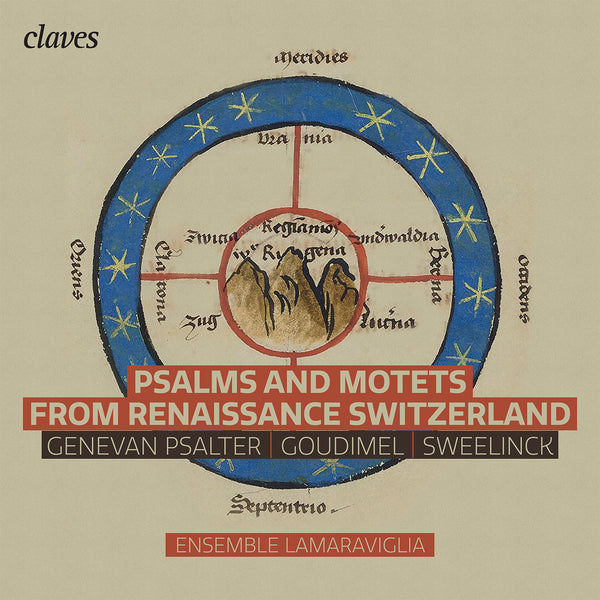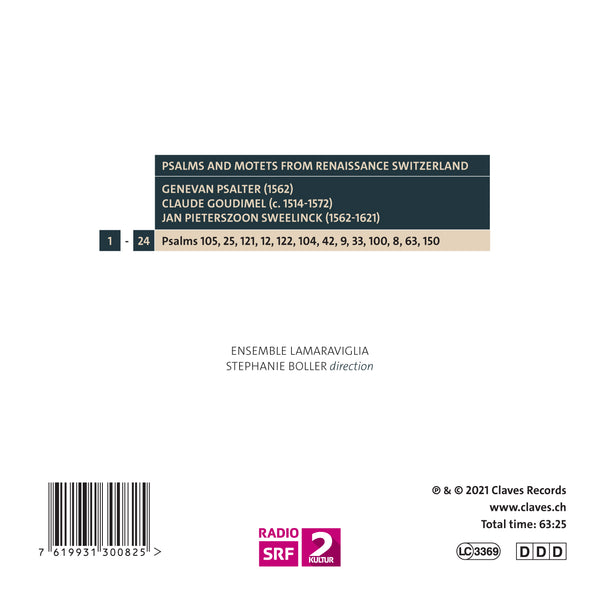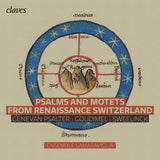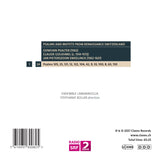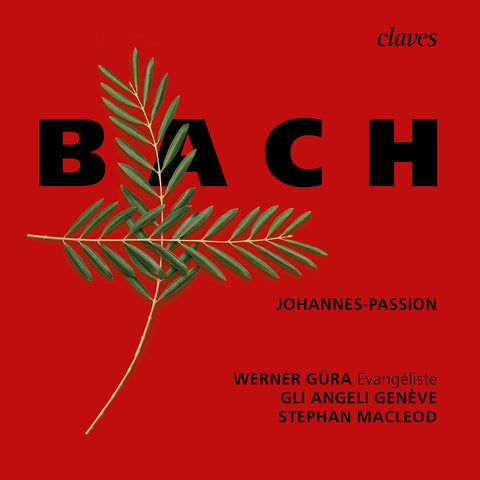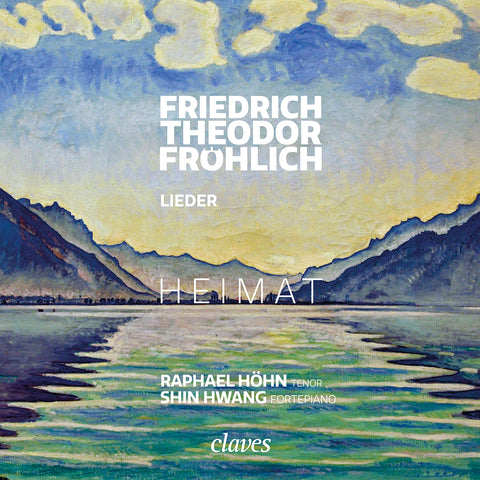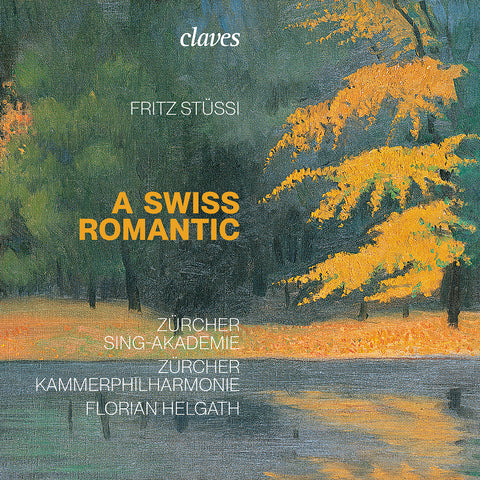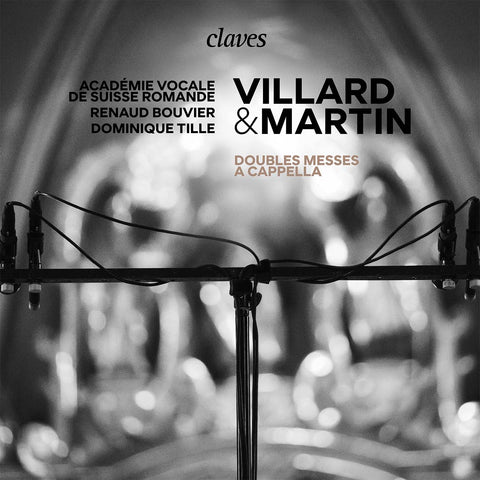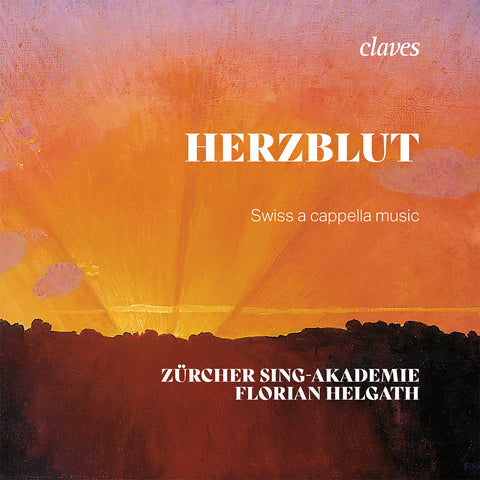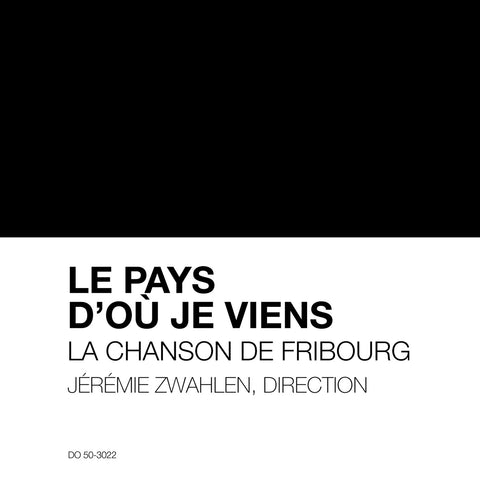(2021) Psalms and Motets from Renaissance Switzerland
Category(ies): Ancient music Oper vocal
Vocal(s): Tenor
Main Composer: Jan Pieterszoon Sweelinck
Ensemble: Ensemble Lamaraviglia
Conductor: Stephanie Boller
CD set: 1
Catalog N°:
CD 3008
Release: 25.06.2021
EAN/UPC: 7619931300825
This album is now on repressing. Pre-order it at a special price now.
CHF 18.50
This album has not been released yet. Pre-order it from now.
CHF 18.50
CHF 18.50
VAT included for Switzerland & UE
Free shipping
VAT included for Switzerland & UE
Free shipping
This album is now on repressing. Pre-order it at a special price now.
CHF 18.50
This album has not been released yet.
Pre-order it at a special price now.
CHF 18.50
CHF 18.50
PSALMS AND MOTETS FROM RENAISSANCE SWITZERLAND
PSALM FEVER IN SWITZERLAND
A musical panorama of the time in all four national languages
The Genevan Psalter - a European synthesis of the arts
In the middle of the 16th century, the Geneva Psalter infected the whole of Reformed Europe – Switzerland included – with a true psalm fever. The first complete collection of all 150 psalms, promoted by the Genevan reformer Jean Calvin, was published in 1562. The psalm verses were translated into French and provided with melodies by various Genevan cantors.
Thanks to the collection’s immense importance for the Reformation and its unique artistic content, these psalms inspired like none before the most influential composer of the time to write a large number of polyphonic psalm settings. The four-part psalms composed by Claude Goudimel (c. 1514-1572) were published in 1564, just two years after their initial release. Set in a simple note-against-note setting with the well-known Genevan melodies in the tenor part, these psalms quickly gained incredible popularity. They were provided with translations of the texts into German, Dutch, Italian, even Rhaeto-Romanic and printed in large quantities, so they spread in no time throughout Europe, reaching even Switzerland’s furthest mountain valleys.
>> Read more in the booklet <<
***
Lamaraviglia – Moving sound art from the Renaissance to early Baroque flows from this ensemble’s every note and breath.
When mezzo-soprano Stephanie Boller founded the vocal ensemble of soloists in 2010, she immediately focused on linguistic refinement, emotional range and a homogeneous sound. The ensemble’s singers are all specialists in their field. They came from countries worldwide to study at Switzerland’s leading music schools, first and foremost the Schola Cantorum Basiliensis. Anyone who has experienced Lamaraviglia on stage and backstage knows how much positive energy is to be expected. The Swiss-German, German, French, Brazilian, English and Italian languages and cultures meet here. Thanks to their unique backgrounds, the musicians repeatedly reveal new facets of the music and set it in a dynamic present. The interplay between tension and relaxation, dissonance and consonance, speech rhythm and melody has an impressive effect on all facets of the group’s musical work.
The singers’ collective creative energy is characterised by a desire to establish an immediate connection with the audience at linguistic, musical and emotional levels. Their dramaturgically designed programmes bear an unmistakable signature. Some appreciate the ties with a selected epoch in a particular place. Others are inspired by a historical reference in which the social context is also actively included.
The ensemble feels connected to its homeland and conceives programmes focusing on Switzerland that are an absolute novelty. Musical connections between Switzerland and other countries are examined, as are the most popular musical hotspots at different historical times. Singing in the four national languages of Switzerland is a question of honor for Lamaraviglia. Indeed, also in Romansh!
***
| 1 | Genevan Psalter | 105 | Ludè tuots la Divin’ essentia | |||||||||||
| 2 | Jan Pieterszoon Sweelinck | 105 | Ludè tuots la Divin’ essentia | a 7 | JJ, SB, SS, MD, IH, CS, JA | |||||||||
| 3 | Claude Goudimel | 25 | A toy, mon Dieu, mon cœur monte | a 4 | SB, IH, MD, JA | |||||||||
| 4 | Jan Pieterszoon Sweelinck | 25 | A toy, mon Dieu, mon cœur monte | a 5 | SB, SK, IH, MD, JA | |||||||||
| 5 | Genevan Psalter | 121 | In ôt hae vers ils munts guardô | |||||||||||
| 6 | Jan Pieterszoon Sweelinck | 121 | In ôt hae vers ils munts guardô | a 4 | SB, SK, MD, JA | |||||||||
| 7 | Claude Goudimel | 12 | Am do succuors ô Dieu | a 4 | SB, SK ,MD, IH, JA | |||||||||
| 8 | Jan Pieterszoon Sweelinck | 12 | Am do succuors ô Dieu | a 5 | SB, SK, MD, IH, JA | |||||||||
| 9 | Genevan Psalter | 122 | Erfreut hat sich mein Herz und Muth | |||||||||||
| 10 | Jan Pieterszoon Sweelinck | 122 | Erfreut hat sich mein Herz und Muth | a 4 | SB, IH, MD, JA | |||||||||
| 11 | Genevan Psalter | 104 | Sciogl‘ al Signor alma mia canti bei | |||||||||||
| 12 | Claude Goudimel | 104 | Sciogl‘ al Signor alma mia canti bei | a 4 | SB, SK, MD, IH, JA | |||||||||
| 13 | Jan Pieterszoon Sweelinck | 42 | Sco ziev’ ouva fraschia gira | a 8 | JJ, SB, JT, SS, MD, IH, CS, JA | |||||||||
| 14 | Jan Pieterszoon Sweelinck | 9 | De tout mon coeur t‘exalteray | a 4 | SB, SK, MD, IH, JA | |||||||||
| 15 | Genevan Psalter | 33 | Hor su, voi spirti giust‘ e santi | |||||||||||
| 16 | Claude Goudimel | 33 | Hor su, voi spirti giust‘ e santi | a 4 | JJ, SB, JT, SS, IH, MD, JA, CS | |||||||||
| 17 | Genevan Psalter | 100 | Vus chi sur terra stais, cantè | |||||||||||
| 18 | Jan Pieterszoon Sweelinck | 100 | Vus chi sur terra stais, cantè | a 5 | SB, SK, IH, MD, JA | |||||||||
| 19 | Claude Goudimel | 8 | O nostre Dieu et Seigneur amiable | a 4 | SB, SK, IH, MD, JA | |||||||||
| 20 | Jan Pieterszoon Sweelinck | 8 | O nostre Dieu et Seigneur amiable | a 5 | SB, SK, IH, MD, JA | |||||||||
| 21 | Jan Pieterszoon Sweelinck | 63 | O Dieu, t’êst quel Dieu ferm ch’eau hę | a 6 | SB, LL, SS, IH, MD, CS, JA | |||||||||
| 22 | Genevan Psalter | 150 | Lobet Gott im Himmelreich | |||||||||||
| 23 | Claude Goudimel | 150 | Lobet Gott im Himmelreich | a 4 | JJ, SB, LL, SS, MD, IH, CS, JA | |||||||||
| 24 | Jan Pieterszoon Sweelinck | 150 | Or soit loué l‘Éternel | a 8 | JJ, SB, LL, SS, IH, MD, CS, JA | |||||||||
Ensemble Lamaraviglia
Stephanie Boller, direction
Stephanie Boller (SB), Cantus
Jessica Jans (JJ), Cantus
Stefan Kahle (SK), Altus
Lisa Lüthi (LL), Altus
Jan Thomer (JT), Altus
Stefan Steinemann (SS), Altus
Ivo Haun (IH), Tenor
Matthias Deger (MD), Tenor
Jedediah Allen (JA), Bassus
Csongor Szanto (CS), Bassus
REVIEWS
« Osons un anachronisme: il y eut un temps, au XVIe siècle, durant lequel la Suisse a été championne d’Europe. D’une certaine Europe du moins, éminemment musicale et rigoureusement protestante. Pour saisir ce destin qu’on aurait tendance à oublier de nos jours, il faut tendre l’oreille vers une petite merveille: cet album que publie l’Ensemble Lamaraviglia pour le compte du label romand Claves et qui documente une belle séquence de l’histoire culturelle helvétique. [..] » - Rocco Zacheo, août 2021
“For this quietly luminous recording the Ensemble Lamaraviglia has taken 24 selections from the songbook and presents them in a variety of versions: the unison melodies, the Goudimel settings, and the more elaborate Sweelinck settings. The result is so lovely that you’ll be left wishing they’d done all 150 psalms and presented the result as a box set. Hopefully there will be more installments in the future.” - July 2021
« [..] Die 63 Minuten Spieldauer bieten genug Abwechslung durch die verschiedenen Sprachen und Satzweisen auch ohne Beteiligung von Instrumenten. Am Ende ahmen die acht Singstimmen in Sweelincks Fassung des 150. Psalms einen Teil der im Text erwähnten Instrumente aber wenigstens lautmalerisch nach. Sie tun das so keck, dass man meint, der französische Chanson-Meister Clément Janequin habe beim Komponieren dem eine Generation jüngeren Amsterdamer Organisten die Hand geführt. » - August 2021
« [..] L’Ensemble Lamaraviglia, dont c’est le premier disque, illustre ici toute la diversité et la plasticité de ces psaumes, en chantant notamment sur la musique de Sweelinck les versions en romanche de Lurainz Wietzel (1661). D’une transparence parfaite, le contrepoint est subtilement phrasé. Ces déclinaisons inattendues confèrent à ces pages une touche d’exotisme et révèlent un pan oublié de l’Histoire des polyphonies protestantes. » - Guillaume Bunel, juillet 2021
Echo Magazine
« C’est en pleine ferveur réformée suisse que nous immerge l’ensemble vocal Lamaraviglia. La collection des 150 Psaumes de David, traduits en rimes françaises et publiés à Genève en 1562 sous l’impulsion et la supervision de Jean Calvin, a très tôt constitué le recueil liturgique officiel de l’Eglise de Genève. [..] » - Jean Borel, octobre 2021
« Mit der Reformation brachten Religionsflüchtlinge ihre musikalischen Traditionen in die neue Schweizer Heimat, was sich in diesem wohlüberlegten Programm widerspiegelt. Der Genfer Psalter war Auslöser für vierstimmige Psalmvertonungen von Goudimel und kunstvolle Psalmmotetten Sweelincks, die - auf einer Tradition in einem kleinen Örtchen im Engadin basierend - sogar mit rätoromanischen Texten gesungen werden. Lamaraviglia bietet mit wohl grundierendem Bass eine sehr inspirierte und textaffine Interpretation. » - Reinmar Emans, November 2021
“[..] This is the first recording from the voices-only Ensemble Lamaraviglia, based in Basel though comprising many nationalities; and they sing beautifully throughout, with impeccable intonation and crystal-clear balance. [..]” - David Fallows, October 2022
« [..] Das siebenköpfige Ensemble Lamaraviglia stellt einige dieser Gesänge in großer Klarheit und Geschlossenheit vor. Das allein macht diese Aufnahme zu einem musikalischen und musikgeschichtlichen Juwel. [..] Bemerkenswert ist, dass das Ensemble Lamaraviglia die Psalmen in rätoromanischer Sprache singt. Es handelt sich um eine in jeder Weise empfehlenswerte Aufnahme. » - Diederich Lüken, August 2022
« Tout est parti du Psautier genevois rassemblé autour de Calvin. La large diffusion de ses mélodies a donné naissance à des oeuvres polyphoniques en français, allemand, italien, romanche, chantées jusque dans les vallées alpines. L’ensemble vocal suisse Lamaraviglia témoigne de l’influence européenne de ce psautier, en interprétant chaque fois la mélodie de base à une voix, puis sa réécriture polyphonique par des compositeurs connus dans ce qu’était la Suisse entre le XVIe et le début du XVIIIe siècle. [..] Une splendide découverte. » - Elisabeth Hass, juillet 2021
“[..] The Ensemble Lamaravilgia is an excellent group of singers. I had never heard of them, but I am impressed by what they bring to the table here. Thanks to the perfect blending of the voices, the monophonic psalms and the note-against-note settings by Goudimel come off perfectly. It also guarantees the maximum of transparency in Sweelinck's polyphonic settings. For me, who has grown up with the Genevan Psalter, this is a disc to treasure. I am sure that it has also the qualities to convince others of the beauty of these melodies.” - Johan van Veen, November 2021
“A carefully and knowledgeably put together program related to the turbulent period of the Reformation with, at its center, John Calvin (1509-1564), who lived and worked in Geneva and who, contrary to what many might derive from the name, was not a Dutchman but a French-Swiss theologian who, as Jehan Cauvin, saw the light of day in Noyon, France, and died in Geneva, Switzerland. [..] Founded in 2010 by Stephanie Boller, Ensemble Lamaraviglia is a small ensemble specialized in early music and is active on the European stages as well as in the studio. For these psalms and motets, there are of course no instrumentalists involved: there is only a cappella singing: 2 cantus, 4 altus, 2 tenors and 2 basses. It turns out to be a homogeneous company that breathes new life into these four- to eight-part miniatures with the necessary differentiation. Issues of balance and intonation are not called into question, while the suggested church acoustics contribute to the creamy character of the whole. [..]” - Aart van der Wal, August 2021
“[..] On its debut CD, the Swiss ensemble Lamaraviglia has followed in the musical footsteps of the Geneva Psalter – all the way to the remote corners of the Engadin in the Rhaeto-Romanic Grisons. It is a wonderful, enriching musical journey on which the Swiss ensemble takes us on. The tonal homogeneity, the unspoken musical understanding are simply impressive. Moreover, the singers amaze with their diction in all Swiss national languages as well as in Old French. The clear text and the baroque musical interweavings come together perfectly here in a harmonious arrangement.” - Guy Engels, June 2021






